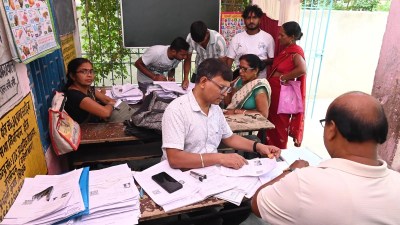In orange country amid the stink of rot, Cong claims it scents victory
The calculus of the orange grove is very simple. A live tree bears fruit after four to five years and continues to yield more than Rs 300 a ...

The calculus of the orange grove is very simple. A live tree bears fruit after four to five years and continues to yield more than Rs 300 a harvest for the next 15 to 20 years. On the other hand, the wood from a dead tree fetches Rs 30.
Two years ago the number of trees in Shantaram Thakre’s orchards exceeded a thousand. Last year, hobbled by a power crisis, he could not water his trees properly and 200 of them died. Angry farmers like Thakre voted the Congress out in all seven Chhindwara constituencies.
This year, he has already lost 500 trees. The power situation is even worse and Congress candidate Kamal Nath is hoping to reap the bitter harvest of this anger, which is now directed at the Uma Bharti government.
Thakre is an educated man with a B.Sc. degree while his wife has a doctorate in Hindi. He lives in the village of Pipla, just a few miles away from the Jam Samvli Hanuman temple where Uma Bharti initiated a comedy of errors with her offering of cake. ‘‘I planted the orange trees six or seven years back,’’ says Thakre.
‘‘By now, I should have been looking at the profits.’’
A month after his latest harvest, he stands amidst the wood from the hundreds of trees he has had to chop down. His responsibilities include his parents, his wife, a two-year-old son, and two loans totalling Rs 1 lakh. ‘‘Every year I would take a loan and repay it after the harvest. This is the first year I have not been able to do so,’’ he says. ‘‘Last year was bad but even then the harvest yielded more than Rs 1 lakh. This year I barely got Rs 8,000.’’
The farmers in Madhya Pradesh have been hit by a double whammy, explains Ramesh Borkhe, the biggest orange trader in Sausar. A bumper harvest, countrywide, brought down orange prices by half. But trees are dying in MP, which means they have less to sell—and at lower prices.
The farmers have already shown their anger to the Congress, which used to give them six hours of electricity a day. Now the anger is directed at Uma, whose governmment gives just four hours of power.
Farmer after farmer repeats the same sorry story. Once, electricity was plentiful. Now the trees are dying and they are suffering, says 21-year-old Prakash Ingole.
All this is music to Kamal Nath’s ears. It is indeed ironic that the man widely blamed for the power situation in MP due to the hold he is alleged to have exercised over the electricity board during Digvijay Singh’s tenure, may well be the one who gains from the crisis. The BJP is trying to make this point, holding Kamal Nath responsible for the mess. This may sell elsewhere, but not in Chhindwara. Kamal Nath seeks to remind his voters that he pampered them, even if it was at the expense of others.
‘‘Whatever hold I had was only used to benefit Chhindwara,’’ he says. ‘‘I tell voters I gave them free electrcity for 10 years, and electricity around the clock for eight years. The BJP can’t even give them free electricity for 10 months.’’
Farmers like Thakre are in the mood to listen.



- 01
- 02
- 03
- 04
- 05




























